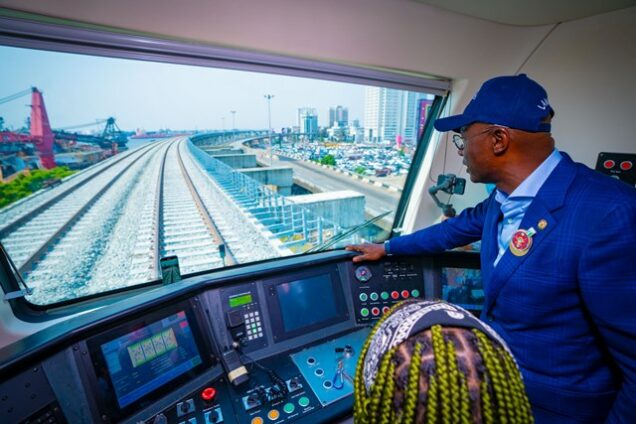
The Lagos State Governor, Mr Babajide Sanwo-Olu, on Tuesday, unveiled the Lagos Rail Mass Transit Red Line Ikeja Overpass alongside his Kwara State counterpart and Chairman of the Nigeria Governors’ Forum, AbdulRahman Abdulrasaq.
The governor, while unveiling the overpass, expressed hope that the Red Line rail, which, according to him, is 95 per cent completed, will be unveiled by President Bola Tinubu before the end of the first quarter of 2024.
He added that the Red Line rail, when operational, will convey about 500,000 passengers daily.
“The completion and formal commissioning of this safety infrastructure is a precursor to the commencement of passenger operations of the Red Line which will be commissioned by our dear President, His Excellency, Asiwaju Bola Ahmed Tinubu, GCFR, in the first quarter of next year.
“In the last four and a half years of our administration, we have prioritised the implementation of our integrated transportation system under the traffic management and transportation pillar of the T.H.E.M.E.S.+ agenda. As a result, we have delivered life-enhancing transport infrastructures which are making life easier for the average Lagosian.
“The LRMT Red Line rail system, the first phase of which we project will move more than 500,000 passengers daily, stretches over a distance of 27 kilometres from Agbado to Oyingbo, with eight stations at Agbado, Iju, Agege, Ikeja, Oshodi, Mushin, Yaba, and terminates at Oyingbo,” Sanwo-Olu said.
The governor added that the 620-metre Ikeja T-flyover was the fourth to be unveiled out of the five overpasses being built as part of the Red Line rail infrastructure.
“The infrastructure we are commissioning today is one of the five overpass bridges we planned for the Red Line alignment. To date, this will be the fourth to be commissioned leaving only the Mushin overpass bridge,” he said.
Speaking on his administration’s achievements in the transportation sector and future plans in the sector, the governor said his government had injected 800 Bus Rapid Transit buses, 700 medium buses, about 1,000 LAGRIDE vehicles and over 30 ferries into the state’s transport system.
He added that his administration was working towards adding about 1,000 Compressed Natural Gas buses to the fleet of public transport in the state before the end of 2024.
This, according to the governor, will not only make commuting within the metropolis easier for residents but also help the state achieve its target of “becoming a zero-carbon state, with the expectation of becoming an emission-neutral city by 2050.”
He said, having completed “the proof-of-concept phase in the deployment of electric vehicle buses to test their suitability for our environment,” his government aims to also deploy 50 electric buses in 2024 for use by residents of the state.
“Our administration is committed to the goal of achieving a zero-carbon state, with the expectation of becoming an emission-neutral city by 2050.
“We are piloting the use of buses powered by Compressed Natural Gas on defined routes. We have only recently concluded the proof-of-concept phase in the deployment of electric vehicle buses to test their suitability for our environment.
“I am happy to inform Lagosians that we are moving to the pilot phase in 2024 with the deployment of 50 electric buses within the first quarter. The Federal Government has also promised to support us with 100 CNG buses within the first or second quarter.
“We are also making commitment to get about 1,000 CNG buses before the end of 2024, so that, indeed, Lagos can be on the journey to ensure that we can compete favourably with other sustainable, reliant and resilient cities that we have in the globe.
“We will continue to work with the private sector on these initiatives for us to achieve seamless integrated transport system befitting the economic nerve centre of Nigeria and the fifth largest economy in Africa,” the governor said.
In his remarks, the Kwara State Governor, Abdulrasaq, who commended the Lagos State Government, said, “It is another bold signatory project of the Lagos State government as this adds to the previous ones that the Lagos State government has built and commissioned. What we are seeing here today supports the fact that development is a process, not a destination.”





